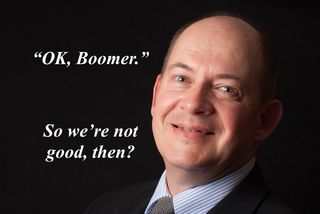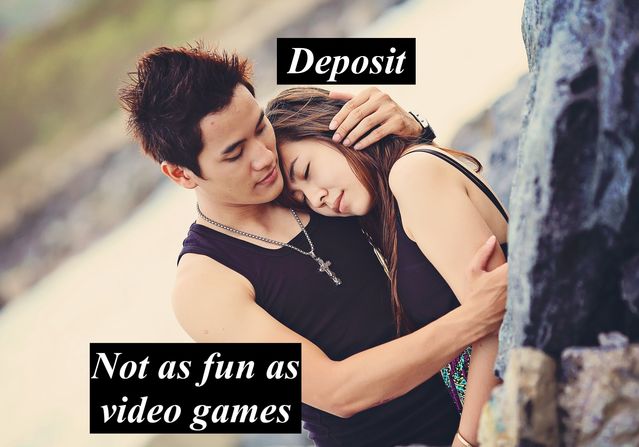Trust
The Psychology of "OK, Boomer"
How should we understand—and respond to—a viral put-down?
Posted November 15, 2019 Reviewed by Matt Huston

In the last few weeks, the phrase “OK, Boomer” has gone viral on social media. A phrase typically used by Generation Z to dismiss the arguments of people in the Baby Boomer generation, “OK, Boomer” doesn’t counter a particular argument so much as broader worldview.
Unlike previous editions of intergenerational conflict, the phrase isn’t about older generations not being “cool” or appreciating a counter-culture aesthetic. It refers instead to a perception that the older generation is unrealistic about the way the world works now, out of touch with the kitchen table issues of climate change, shrinking opportunities for economic advancement, and the suffering caused by wars that never should have been started. How did we get here?
When describing his research on trust, relationships researcher John Gottman tells a story about his own relationship. He was at home, looking forward to reading the end of a mystery novel, when he walked into the bathroom where his wife was brushing her hair. He could tell from her expression that she was sad, but she wasn’t saying anything to him. Gottman could go back to the room to finish his novel, or he could ask his wife what was wrong and spend some time trying to understand what she was dealing with. It’s in these small moments, Gottman argues, that trust is built.

When we make the decision to turn towards someone, to make an effort to build our relationship, we are making an investment in what Gottman calls our “emotional bank account.” This emotional bank account can be built up through repeated small actions to create trust over time. If Gottman takes the time to care for his wife, in the future she will trust him more and be more willing to support him when he is struggling.
This reinforces a point I make often on this blog: to understand behavior, we need to take a dynamic systems perspective. That means we need to understand the history of the person (or relationship) we are studying, and especially the state the person (or relationship) is in immediately before the event we’re interested in. Whether a couple gets in a fight is not just about what was said in the moment; it’s about the history of their interactions and the way they are feeling about each other recently.
So what does this have to do with the phrase “OK, Boomer”? Imagine that instead of members of a couple, we have two generations talking to each other. Each has its own distinct interests and style, but ultimately they are tied together in a relationship. What would it mean if one member of the couple was willing to just off-handedly dismiss the entire worldview of another? To me, it indicates that the emotional bank account is empty. The generations have not been turning towards each other, making deposits that allow for goodwill when criticism is raised.
This is pretty metaphorical. What does it matter if we say this dismissive comment is due to an empty bank account across generations? Well, let’s consider an alternate possible explanation. In one explanation, we judge acts in isolation, ignoring prior history. Being dismissive of someone’s entire world view is rude behavior, and so the phrase “OK, Boomer” is just an instance of bad behavior by people in one generation. The problem would appear to be that Generation Z and Millenials are rude and behaving badly. But when you listen to why people use the phrase, it’s pretty clear it’s because they are frustrated, fed up.
Just telling people who are fed up “don’t be rude to people” without also trying to address why they are fed up also feels dismissive. Just invoking a rule to not be rude to people is likely to backfire, because it ignores the prior history. In some ways, it can actually feel like choosing a side, because it suggests that we should ignore all previous behavior when we evaluate the action.
When evaluating moral behavior, people tend to use a two-person template, with one person serving as the perpetrator and one as the victim. If there is an ongoing cycle, we tend to choose the perpetrator as the first person to act badly from whatever start point we choose. A simple injunction not to say “OK, Boomer” isn’t going to help the situation because it ignores context, and it makes what seems like an arbitrary decision about who to view as the moral victim.

The metaphor of the emotional bank account, on the other hand, suggests that there is a valuable ongoing relationship. The history of interactions is inherent to the view. Additionally, it suggests a very different solution. Instead of saying “don’t behave badly,” this view suggests that the way to remedy the situation is by making more deposits in the emotional bank account. Instead of reaching for the rule, the way to remedy the situation is by demonstrating in some way that the other party is valued. In theory, this can be done by people from either group. Generation Z and Millenials could communicate that they're open to listening to the concerns of Boomers. But in practice, it is typically more effective if this movement towards relationship-building comes from the more powerful group. In this case, that’s the larger, more culturally influential, and more economically secure Boomer generation.
Ironically, the publicized responses in the media have been exactly the opposite of this recommendation. One Boomer argued that “OK, Boomer” is equivalent to “the n-word” (which reminds many of John Mulaney’s joke that if you’re arguing about which word is worse and you won’t say one, then that’s the worse word). A Vice President of the AARP responded: “Ok, Millenials, but we actually have the money.” Instead of making new deposits, people continue trying to make withdrawals on an overdrawn account. It sometimes feels like the refusal to turn back towards people after conflict, but instead fire back and double down on the conflict, is the most prevalent and pressing problem in modern society.
One reason may be because we aren’t understanding conflict in the right framework—as one part of an ongoing relationship that stretches through time and will continue into the future. Psychology, and society, desperately need to stop using an atomized, context-free framework and to start using the rich historical, contextual framework of dynamic systems—and to start thinking in terms of lasting relationships.
References
Gray, K., Young, L., & Waytz, A. (2012). Mind perception is the essence of morality. Psychological inquiry, 23(2), 101-124.




